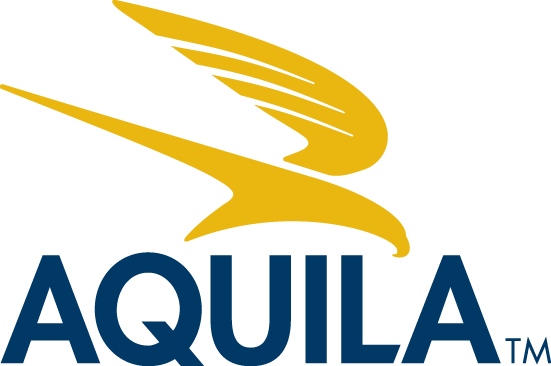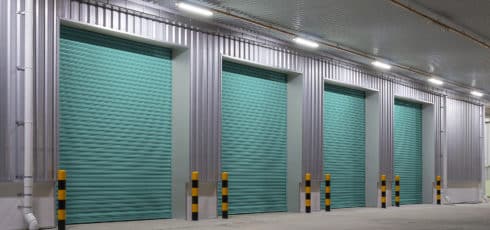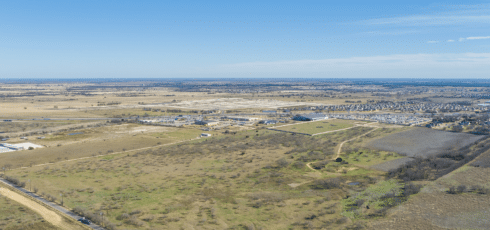When your company decides it’s time to search for commercial space, it can sometimes be difficult to decide between buying vs. leasing. There are pros and cons to each option, and what’s best for your company is largely dependent on your company’s needs and expectations for the future.
We at AQUILA like to arm our clients with as much information as possible before they make their commercial real estate decisions, so whether you are in need of office, retail, or warehouse space, we’ve compiled an overview of the pros and cons of both leasing and buying your commercial space to aid you in the decision-making process.
Read Now: 5 Crucial Steps for Finding the Perfect Office Space to Lease
Leasing Your Space: Pros & Cons
Benefits of Leasing Your Commercial Space
For most tenants, leasing makes the most sense. Here are some of the benefits of leasing a space versus purchasing a property:
1. No Down Payment
When purchasing a property with a traditional loan, you must put down a large payment, typically 10 to 40 percent of the total value.
When leasing a property, you generally only have to put down a security deposit, typically a much smaller total cost than a down payment. In Austin, you will often see landlords asking for a security deposit equivalent to one month’s gross rent, dependent upon other factors such as TI allowance and tenant credit.
Leasing a property frees up a lot of capital that you would’ve spent purchasing a property, and instead allows you to put money into your business or to build out your space.
In any lease versus purchase analysis, you should always factor in the cost of capital and/or opportunity cost from investing in commercial real estate rather than in your business.
Read Next: How Much Does It Cost to Lease Office Space in Austin, Texas? (Rental Rates, Pricing)
2. Landlord Manages Repairs and Maintenance
When you lease space, the landlord is generally responsible for common area maintenance, including things like building repairs, HVAC and plumbing maintenance, etc. The landlord typically has a professional property management and engineering team that will handle matters, from tenant complaints to property-wide issues, on a day-to-day basis.
Owning a building comes with many issues that don’t pertain to your company, and dealing with such issues takes time and money. Leasing your office space allows you to focus solely on running your business and saves you the worry of managing the building, leaving the property management and maintenance to the professionals.
That’s not to say that the landlord manages these items for free. When you lease your space, these expenses are usually included in your gross rent as a portion of the operating expense called common area maintenance expenses.
Read More: What Are Common Area Maintenance (CAM) Fees?
3. Access to Desirable Locations
Most of the time, leasing a property offers you the opportunity to be in a more desirable area than you would in an owner-occupied building. Because substantial development has typically already occurred in these more desirable areas, the cost to purchase buildings or land in the area is going to be higher, often pricing out potential owner-occupants.
Additionally, owner-occupants typically need buildings that are smaller than traditional multi-tenant buildings, which are often 100,000 square feet or larger. There are far fewer small buildings to choose from that currently exist in the market. When considering purchasing land to build your building, it is important to know that land prices are based on the assumption that the purchaser will be constructing the largest building permitted per city zoning. This maximum size is often much larger than a particular user might need, thus making it unaffordable.
Leasing space in an existing building in a desirable location is typically the solution for users who place priority on location. On the other hand, if your company is less concerned with prime location, there may be attractive purchase options along with leasing options.
4. Room to Grow
The greatest factor in choosing to lease is flexibility.
If you are a growing company, leasing offers a far easier method to accommodate growth than buying. You can build in expansion options within your lease, where you have the first rights (also known as the “right of first refusal”) to acquire space that comes available within your building as your company needs it.
With buying, your choices are usually limited to the size of the property purchased or the zoning restrictions of the site you choose to build on.
Read Next: How Long of a Commercial Lease Should I Sign?
Find out how AQUILA helped Zello manage their growth and maintain flexibility with its lease in downtown Austin. Read the case study: Zello’s Office Solution: Selling, Leasing, and Subleasing on Sixth Street.
Disadvantages of Your Leasing Space
1. Cost Variability Upon Renewal
The biggest risk associated with leasing a property is the potential increase in rent that a landlord might ask for when it comes time to renew.
This can create a lot of trouble for your business because it requires you to renew your lease at a higher rate which could effectively force you to move your business to a different location or downsize if you’re not willing to pay the higher cost.
This is one of the primary reasons we recommend enlisting a tenant representation broker to help you negotiate your lease renewal, even if you have a renewal right written into your lease.
2. Improvements Add Value for the Landlord
If you do eventually leave your space, remember that any improvements that you’ve made to the space will directly benefit the landlord.
This means, that if you come out of pocket above your TI allowance for hard cost improvements (countertops, wall finishes, plumbing additions, etc.) that can’t be moved to your next office, all of that added value will go to the landlord on your dime.
Read Next: What is a Tenant Improvement Allowance and What Does it Cover?
Purchasing Your Office Property: Pros & Cons
Benefits of Owning Your Own Commercial Property
In certain cases, it can make sense for a business to purchase an existing building or land to build on. Some of the benefits to owning your own property include:
1. Opportunity to Build Equity
Buying a building will provide your company with a commercial real estate investment that allows you to build up equity over time as you pay off the mortgage and as the property appreciates in value.
This equity can eventually be used as collateral for leverage if you decide to expand your business.
AQUILA PRO TIP
In unique situations, a creative broker could potentially help you negotiate equity into your lease if that is important to you. That said, this is not very common and the opportunities to do this are rare.
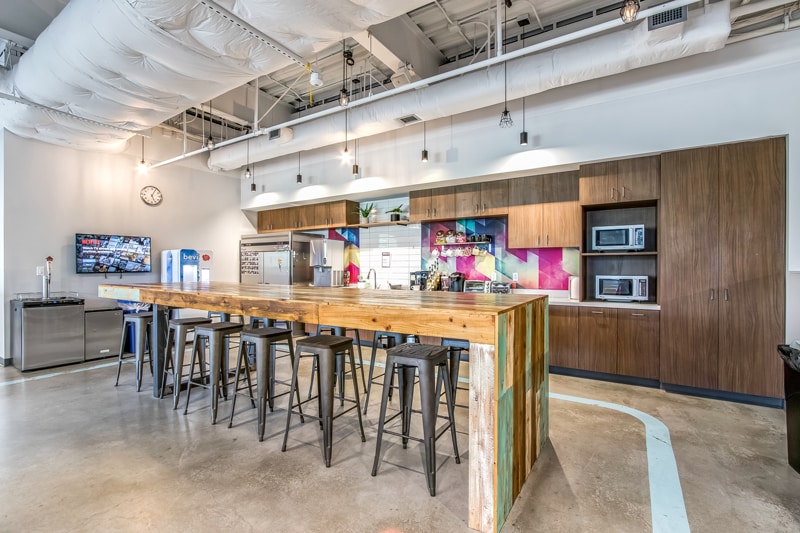
Find out how AQUILA successfully negotiated an equity component into C3’s East Austin office lease. Read the case study C3 Presents: Negotiating Equity in an Eastside Office Development.
2. Fixed Mortgage Payments
The financing associated with your property typically remains fixed.
When taking out a long-term loan (assuming it is a fixed-rate loan), your debt service payments will remain fixed and never increase during the loan period.
Furthermore, there is a notable advantage to putting your money into paying off a mortgage, rather than monthly rent, as you are slowly gaining equity, rather than just lining the landlord’s pocket.
This is especially true in a competitive market such as Austin, where rental rates are at all-time highs.
3. Tax Benefits
If you decide to purchase a property, you can depreciate your building over the life of the asset. This can save you a lot of money when calculating taxes and earnings.
The cost of owning a commercial space can offer you additional tax deductions in the form of mortgage interest, property taxes, and other accounting line items.
Additionally, nonprofits can achieve additional tax benefits by purchasing property rather than leasing.
4. Generate Additional Income & Accommodate Growth
Probably the most obvious and beneficial aspect of owning the property is that you can lease some of your property to other tenants to generate additional monthly income and cash flows.
This is also a good way to allow for future growth. For example, say you only need 75,000 square feet today but know you plan to grow to an additional 25,000 square feet over time, you could purchase a 100,000-square-foot property and lease out the additional space to another tenant(s) during the interim time.
Read Next: Cost to Hire a Commercial Project Leasing Broker
5. Improvements Add Value to Your Bottom Line
Unlike with leasing, any renovations that you make to the space will only add value to your bottom line in the long run.
And, as you are more likely to remain at the property for an extended period, you will not have to recreate these improvements as you move from location to location.
This can create major cost savings, whether you are a manufacturer that requires a number of generators and machinery to be installed for operation or a law firm with top-of-the-line finish-out requirements.
Additionally, any capital improvements that you make on the property will also add to the property’s overall value.
Disadvantages of Owning Your Own Commercial Property
1. Lack of Flexibility
Buying a property or space creates a lack of flexibility for your business. If your business outgrows the space in the future, then you might be forced to lease or buy a new space.
While you have the same risk with a lease, there is more flexibility in the lease in that you can easily reevaluate your real estate needs at the end of your lease term (or even in the middle of your lease) and find a new solution that will better fit your new requirements.
2. Significant Upfront Cost
One of the other primary cons of buying your own commercial space is the large initial upfront costs.
There are many different upfront costs that a purchaser must face. Some of these upfront costs may include:
- Initial Equity Required by Lender (Down Payment)
- Appraisal Fees
- Loan Fees
- Repairs
- Capital Improvement Costs
The significant nature of these costs is often the main reason that companies don’t own their own real estate as that money is better spent re-investing in their businesses.
3. Responsibility for Repairs, Maintenance, and Taxes
Being in charge may be a benefit but can also be a deterrence.
When you purchase a property, you’re now the one responsible for all the repairs and maintenance that a landlord would usually handle.
And if you don’t think you have the time or resources to handle these duties yourself, you most likely will have to hire a property management company or full-time facilities team, which will cut into your profits from owning the property.
Additionally, a common misconception is that owning your own real estate will eliminate the ever-increasing operating expenses that you likely pay on your leased space. Operating expenses are made up of three main components: insurance, CAM expenses, and property taxes. In Austin, the recent dramatic increase in operating expenses can be credited almost entirely to the increased tax assessments. So, while owning the building certainly helps control certain costs, you are still going to face the rising tax rates as a part of your real estate costs.
4. Carrying Additional Value
If you purchase a property that is larger than your current requirement or a land parcel that you do not plan to develop to its full potential on day one, you run the risk of carrying this additional value.
Whether or not you are maximizing the use potential of your property, you will still be required to pay property taxes and insurance fees on the full estimated value.
With a building, you can recoup these costs by leasing out extra space. This once again puts you in the position of either having to spend time playing landlord or hiring a brokerage team to market the space.
Should You Lease or Buy Commercial Space?
The answer to whether you should lease or buy office space is not clear-cut or easy for most business owners.
Your decision will hinge on a combination of financial, tax, and unique company factors.
If your company is stable with little plans for growth and has large amounts of cash on hand, purchasing your property may make sense. On the other hand, if your company is rapidly growing and tends to reinvest cash into business expansion or development, leasing space is likely going to be the right answer for you.
As you contemplate this important decision, you should not only consult your accountant and a financial planner but be sure to discuss your situation with a qualified commercial real estate expert.
If you’re considering buying or leasing office space, one of our tenant representation experts would be happy to talk through this decision with you and help you identify the solution that will best meet your company’s needs.
If you’re ready to start your search for the perfect space, schedule a consultation with one of our tenant representation brokers today.
Or, to continue learning more about the process of finding the right space for your company, read our Ultimate Guide to Finding Office Space.
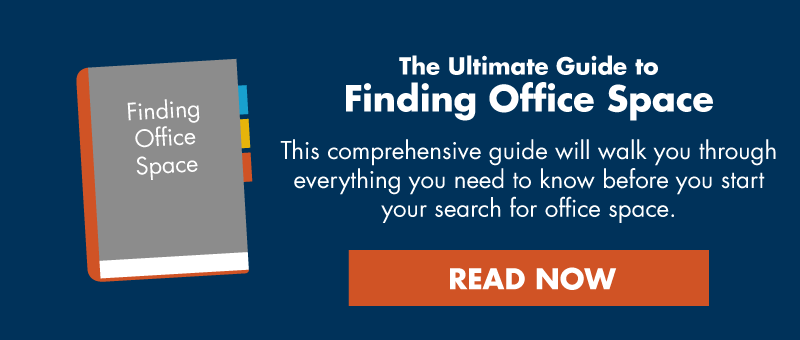
Popular Articles:
- My Office Building Just Sold: What Does that Mean for Me?
- What is a Tenant Representation Broker & What Do They Do?
- 3 Reasons to Use a Tenant Representation Broker for Your Lease Renewal


